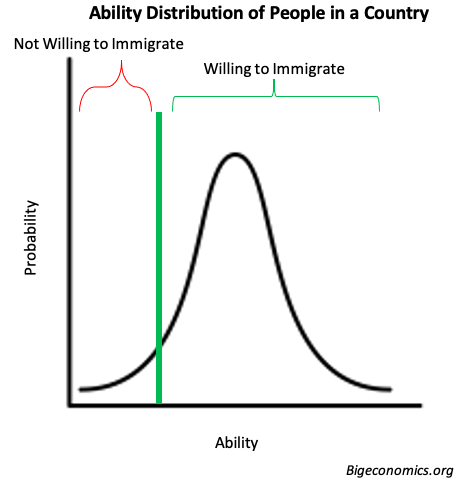The link between immigrants and entrepreneurship is fairly well known, with notable figures such as Sergey Brin (born in the USSR) and Elon Musk (born in South Africa) brought up as luminaries of the link. But beyond these anecdotes what are the facts, and what are the reasons for the difference in entrepreneurship between immigrants and natives?
This article draws on recent research in economics, as well as the personal experiences of immigrants themselves to better understand the link between immigrants, innovation, and entrepreneurship.
The Data
First off, what does the data really say? One study done in the US finds that in 2008, about 24% of entrepreneurs were immigrants, this is significantly more than immigrants’ 19% labor force share.1 This puts immigrants at a 34% higher probability of being entrepreneurs than American natives. Other studies find that immigrants are twice as likely to be entrepreneurs.
Nobel Prize winners, inventors, members of the National Academy of Sciences and National Academy of Engineering are disproportionately immigrants.
Another study done in the US found that 25% of all tech and engineering companies started in the mid-2000s had at least one immigrant co-founder. Again, this is disproportionate given their share of the labor force.
But wait, there’s more. Amongst the highest achievers in science and technology in the US, immigrants are overrepresented. That is, Nobel Prize winners, inventors, members of the National Academy of Sciences and National Academy of Engineering are disproportionately immigrants.2
Making Sense of the Data
How do we make sense of these facts? What is it about being an immigrant that makes one more entrepreneurial and more innovative?
Selection Effects
We must start by asking what does being an immigrant say about a person?
What kind of a person thinks they can move to a foreign land, with foreign customs, and a language they don’t understand, and thinks they’ll be able to succeed? Not to mention, willing to leave behind their relatives, close friends, ethnic food, and traditions to do so.
In 2008, immigrants made up 25% of college-educated workers in STEM and about 50% at the PhD level
The point is, an immigrant from, for example, China is not just an average Chinese person, they are more likely to be above average in ability, ambition, and many other traits. In economics, this is referred to as a “selection effect”, i.e. the act of immigrating is selective, only certain types of people will do it.
If this is the case, this explains a good deal of the difference between immigrants and natives in becoming entrepreneurs and innovators. Based on these selection effects, the average immigrant could be expected to be more talented than the average American, and thus be more innovative and entrepreneurial.

Data on STEM
While the theory of selection effects is reasonable, it’s helpful to see what empirical studies have to say. It turns out that for STEM degrees (STEM stands for Science Technology Engineering and Math), the fields most associated with entrepreneurship and innovation, immigrants are highly overrepresented.
Consider that in 2008, immigrants made up 25% of college-educated workers in STEM and about 50% at the PhD level. As the authors point out, this is astonishing, considering that this doesn’t include 2nd and 3rd generation immigrants.3
As a 2017 New York Times article reports, this shortage of native STEM workers doesn’t seem to be getting better. In a 2016 survey of American and Canadian universities, 64% of doctoral candidates in computer science were international students. And of the remaining 36%, you wonder how many were immigrants.
Critically, research suggests that Americans that do go into STEM will be just as innovative as their immigrant peers.4 Thus, a big reason that immigrants are more innovative and entrepreneurial than natives seems to be the fact that they actually go into STEM.
The Shortage of Natives in STEM
So why is it so few American natives are going into STEM?
While some studies mention competition from immigrants for slots in STEM programs discouraging natives, it seems that it primarily comes down to immigrants valuing STEM degrees more.
A study focusing on immigrant children’s decision to major in STEM finds evidence that immigrant children prefer STEM subjects due to the English language barrier they face in other subjects like History or English.
Additionally, the mathematical training the child received before emigrating transfers to their new country, whereas training in the other subjects doesn’t. In this way, immigrants have a comparative advantage in STEM subjects relative to natives.
While this explanation is insightful and surely plays a role, there seems to be more to the story.
As an immigrant child myself, who majored in STEM, I can attest that STEM is difficult and requires long hours of study, and this alone tends to put off many from pursuing it.
Additionally, if an immigrant is going to University, it’s generally for the purpose of getting a job, not because of social pressure or tradition. As such immigrants tend to major in fields that promise a good job with good wages, STEM degrees fit the bill extremely well. Degrees in the arts are rarely considered as majors by immigrants, and not merely because of language barriers.
Combine that with the well-known immigrant work ethic and tolerance of (mental) discomfort and I think you have a fuller explanation. However, I admit that these are merely my thoughts and more research remains to be done.
What About Ethnic Mom & Pop Shops?
As you’ve probably noticed, many immigrants tend to be entrepreneurial not only in Silicon Valley but also in certain service or retail occupations. It’s common to see an Indian gas station owner, Korean dry cleaner, or a Vietnamese nail care salon. This doesn’t seem to fit the earlier discussion well. What’s behind these various immigrant groups specializing in these distinct industries?
One of the explanations has to do with the tight ethnic network that immigrants tend to form upon arrival in their new home. Economists refer to this as “social capital”, the asset of being in a high trust community, where members provide each other with valuable information, advice, informal loans, and more.
The network tends to develop skills in a particular niche and due to the nature of the tight-knit community and its frequent interactions, the skills are shared and spread to others in the network. Soon enough, you find Ukrainians are known for building houses or Koreans for their dry-cleaning services, and so on.
But the question that remains to be answered is why do the immigrants tend to go into self-employed occupations like these in the first place? Why don’t they simply get a job for a big business or corporation?
If you think about it, it’s relatively straightforward. As an immigrant arriving in a new country, your previous education and experience are largely discounted by potential employers. If they give you a job, they’ll expect you to start from the bottom anyway. You already know someone who works in the dry cleaning or construction business, it pays good money, you get to work with other immigrants like yourself, economically, it’s an easy decision: go into self-employment.

Studies find that immigrants who were self-employed before emigrating are more likely to be self-employed after doing so. Well, if you’re an immigrant, you probably come from a less developed country where self-employment is not viewed as a risk but rather just a common way of making a living.
During hard economic times in Ukraine, my father would work a job in the formal sector in the daytime, and in the evening would work odd construction projects to be able to put food on the table for the family. This approach to making a living is common in less developed countries, something you’ll see everywhere if you go to visit.
Cultural Reasons
So far in seeking to understand the reason why immigrants are more innovative and entrepreneurial than natives, we’ve discussed that immigrants are on average selected for higher ability, tend to go into STEM fields disproportionately more than natives, and also the tight ethnic network that gives them a comparative advantage in becoming self-employed in certain sectors.
There is no such thing as “9 to 5” for most immigrants, they simply work until they have food on the table, however long it takes.
There is one thing left to consider, and that is the differences in culture and experience.
As immigrant entrepreneur Patrick Bet-David talks about in the video below, many values important to entrepreneurship tend to differ significantly between immigrants and natives. Among others, he lists the willingness to work long hours, fear of risk, the value assigned to ownership, and the value assigned to money.
In discussing work ethic, he states: “There is no such thing as “9 to 5” for most immigrants, they simply work until they have food on the table, however long it takes”.
Similarly, if you come from a war-torn country or one whose government completely collapsed causing you to lose everything, you can be sure that the risk of business failure does not seem that catastrophic.
Fresh Perspectives on Old Problems
Additionally, experiencing multiple cultures endows immigrants with fresh perspectives on old problems. And since entrepreneurship comes down to offering solutions to problems, these unique perspectives are an advantage in forming new and creative solutions.
A study comparing college students who had lived abroad for a semester and those who stayed home found significantly better (17%) entrepreneurial ideas for those with more cultural experience. The authors argue that the experience of living abroad was a source of new ideas, enabling new and creative solutions.
Summing it Up
We’ve looked at a lot of explanations in this article for why immigrants are disproportionately innovative and entrepreneurial. Ultimately it comes down to four reasons:
- Immigrants are favorably selected for their higher ability
- Immigrants go into STEM and advanced STEM degrees more
- Immigrants form tight ethnic networks, giving them a comparative advantage in certain sectors
- Immigrants have cultural values and experiences that give them an advantage in becoming entrepreneurs
Thanks for reading!
What are your thoughts on the points of this article? Why do you think immigrants and natives are so innovative? Leave your thoughts below!
[expand title=”Expand Sources”]
- https://www.nber.org/system/files/chapters/c13502/c13502.pdf see p188
- Same as 1, see p192
- https://www.hbs.edu/faculty/Pages/item.aspx?num=48401 See p2
- Same as 3, See p3
[/expand]



